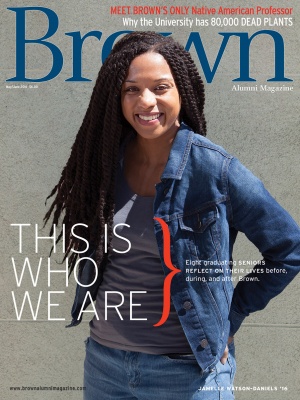The philosopher of science, Karl Popper, said that real science makes every effort to disprove accepted theories. For the most part, man-made climate change has benefited from few alternative hypotheses, perhaps due to the enormous (many billions of dollars...follow the money) invested by the government into researchers bent on maintaining the status quo of climate science. Thankfully the ‘deniers’ receive a relative pittance to put forth and study contrary hypotheses, thereby keeping science alive.
—Martin Kendig ’74 PhD
Thousand Oaks, Calif.
All most of us know about nuclear power is based on 50-year-old technology. (What was your phone like 50 years ago?)
—Richard Pohle ’61
As a Canadian, it is concerning to note the amount of funding anti-pipeline and anti-oil sands organizations receive, while not a murmur of complaint is launched at the alternative movement of oil by (proven unsafe) rail all over North America, or the large volumes of oil that are imported into eastern Canada by sea from Saudi Arabia and other foreign sources. We cannot stop all oil distribution from Canadian wells or mines instantaneously—what would happen would be greater importation of substitute oil from much less clean/green sources to fulfill U.S and Canadian demand. Canada is a far better oil source, and its transportation is by far safer pipelines, than any alternatives proposed. We all want to end fossil fuel dependency, but in sensible, economically effective ways.
—Ronald E. Baker ’57
Port Rowan, Ontario, Canada
The world is 78% water, that is where we should be concentrating our research. The best study on climate has been done in Antarctica with ice borings. We can learn a lot regarding the changing climate over thousands of years. Climate does change. We call it winter, spring, summer, and fall.
—Charles Shumway ’58, ’66AM
Naples, Fla.
We are in the third interglacial phase of the Quartenary Ice Age. Ice ages last 3 million years. This one is 2.6 million years old. This is what is predicted:
- Sometime before 2060 AD, the 4th glacial phase could begin.
- If a 4th glacial phase begins, we will chase polar bears in Mississippi, start warming in 2260 AD, and end the ice age in 441960 AD.
- If a 4th glacial phase does not begin by 2060 AD, the ice age will end in 221,960 AD.
- When the ice age ends, glaciers will be gone, surface temperature will be 6°C warmer, cloud cover will have increased from 61% to 75%, there will be no storms, and every place will have Hawaii’s climate.
The climatological changes we notice are caused by low cloud cover causing uneven heating and are driven by the wobbling of Earth’s spin axis changing where the storms form. Our large cities have generated so much pollution that they have created local micro climates. Some of them may become uninhabitable in the current century. Addressing urban pollution requires cooperation, effort, and modest financial investment. It should not be sidelined by diversion of resources to economically crippling and useless efforts at “capping carbon.” It is difficult to speak in a verbal cyclone, but someone should. Why couldn’t it be Brown?
—JW Lane ’71 PhD
Tallahassee, Fla.
Climate change denial is a distraction. The important discussion is what should we do about it. The answer is local nuclear power plants. All most of us know about nuclear power is based on 50-year-old technology. (What was your phone like 50 years ago?) It is time to inform ourselves about current nuclear potential.
—Richard Pohle ’61
Bethlehem, Pa.
Sadly, the freedoms of capitalism and democracy allow individuals and institutions to speak with their money to lobby politicians towards their way of thinking. Unless we outlaw lobbying, we're left with good sense vs. monetary influence. It doesn’t mean that the logical, science-based solutions won't prevail, just that they will be delayed. It’s tough for many people to deal with change, easier to stick with what they know and ignore the consequences, even if it's killing them (i.e. vaccines).
—Oscar Groomes ’82
Charlotte, N.C.
Thanks for covering the important work of the Urban Environmental Lab in exposing the influence of money in our politics, policies, and even understanding of what’s real. We are moving from a majority to a supermajority that support campaign finance and lobbying reform that would go a long way toward restoring government ‘of, by, and for’ the people. Only a Constitutional amendment can undo the damage done by successive Supreme Court rulings, including Citizens United. I urge you all to find a local effort to advance such an amendment and get involved.
—Laura Gang ’78
Roslindale, Mass.
A response to “Follow the Money,” (Courses of Study, April-May ’21). The students and their professors have assumed that all readers know what climate change denial really means. It was never defined. They would be hard-pressed to find corporate “deniers” who would deny that after over 200 years and a 50% increase in atmospheric carbon dioxide, the Earth’s average temperature anomaly has risen just a fractional amount, less than one degree C. Or that sea level has risen less than a foot. Hardly compelling evidence for a climate crisis or emergency worthy of a denial. The opposite of climate denial is climate acceptance of dire model forecasts with urgent efforts to keep the Earth’s temperature stable. Those global warming goals of zero emissions and Net-zero CO2 drawdowns from the atmosphere of more than just a few parts-per-million. Skepticism is warranted for significant carbon capture and geological storage because just one ppm of CO2 would require the permanent storage of over 7,500 million metric tons (CDIAC). Such a huge amount is beyond the capability of human technology. This huge quantitative barrier to climate mitigation should be acknowledged in any concerns about reversing climate denial movements to achieve the Paris Accord goals.






